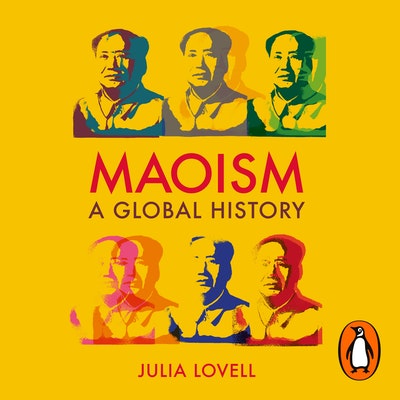- Published: 19 November 2019
- ISBN: 9781473579552
- Imprint: Vintage Digital
- Format: Audio Download
- Length: 21 hr 43 min
- Narrator: Nancy Wu
- RRP: $32.99
Maoism
A Global History
- Published: 19 November 2019
- ISBN: 9781473579552
- Imprint: Vintage Digital
- Format: Audio Download
- Length: 21 hr 43 min
- Narrator: Nancy Wu
- RRP: $32.99
A landmark work giving a global panorama of Mao's ideology filled with historic events and enlivened by striking characters
Jonathan Fenby, author of The Penguin History of Modern China
Julia Lovell has given us a masterful corrective to the greatest misconception about today’s China. For too long, visitors who marveled at China’s new luxuries and capitalist zeal assumed that Maoism had gone the way of its creator. That was a mistake. Lovell’s account - eloquent, engrossing, intelligent - not only explains why Xi Jinping has revived some of Mao’s techniques, but also why Mao's playbook for the "People’s War" retains an intoxicating and tragic appeal to marginalized people the world over
Evan Osnos, author of The Age of Ambition
Lovell takes us on an exhilarating journey, tracing the spread of Maoist theories across South-east Asia and then Africa, ending up in today’s China… The historical sweep of this book is impressive
Christopher Coker, Literary Review
Revelatory and instructive… [a] beautifully written and accessible book
David Aaronovitch, The Times
Lovell has produced a work which may well be the most harrowing, fascinating and occasionally hilarious book on the subject thus far
Stuart Kelly, Scotland on Sunday
Wonderful
Andrew Marr, New Statesman
There is not a dull sentence in this scintillating and wry account of the global impact of Maoism
Michael Burleigh, Evening Standard, *Book of the Week*
Lovells’s descriptions of…global strands of Maoism are well-researched and colourful
Economist
Lovell has a gift for compressing long and convoluted histories via just the right stories, characters, moments, and statistics… In vivid, often grim detail, Lovell shows us how and why Maoism has proven better, both inside and outside China, at attacking state infrastructure than building it up
Christopher Harding, Daily Telegraph
Lovell is an accomplished storyteller with a nuanced and sophisticated understanding of China’s relationship with itself and the world
Isabel Hilton, Prospect
Lovell breaks new ground and does so in a wonderfully well-written account packed with horrors, extraordinary characters and occasionally macabre humour
Chris Patten, Tablet
An exciting, alternative history of the 20th century that deviates from the well-rehearsed narrative that relays between Washington and Moscow
Tanjil Rashid, Financial Times
Highly readable and well-researched book… timely
David Priestland, New Statesman
A fascinating account of the influence of Maoism, during the cold war and beyond
Gideon Rachman, Financial Times, *Books of the Year*
[A] superb and chilling study
Dominic Sandbrook, Sunday Times, *Books of the Year*
A fascinating and timely work on one of the most influential and disruptive strands of Marxist thought: that of Mao Zedong… the book reveals the relevance of Mao to our current populist age
London Review of Economics, *Books of the Year*



